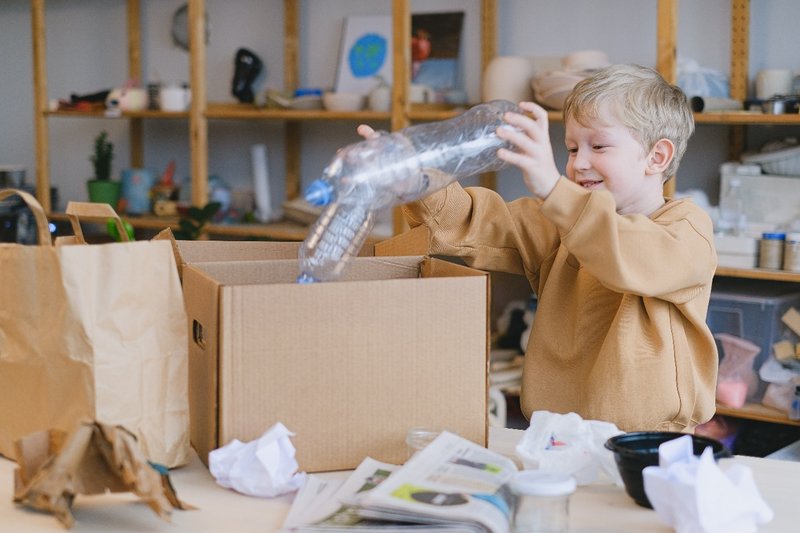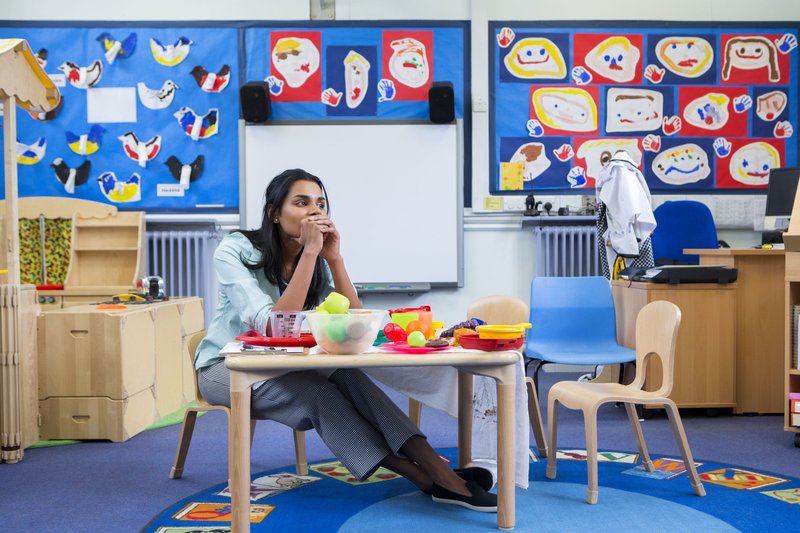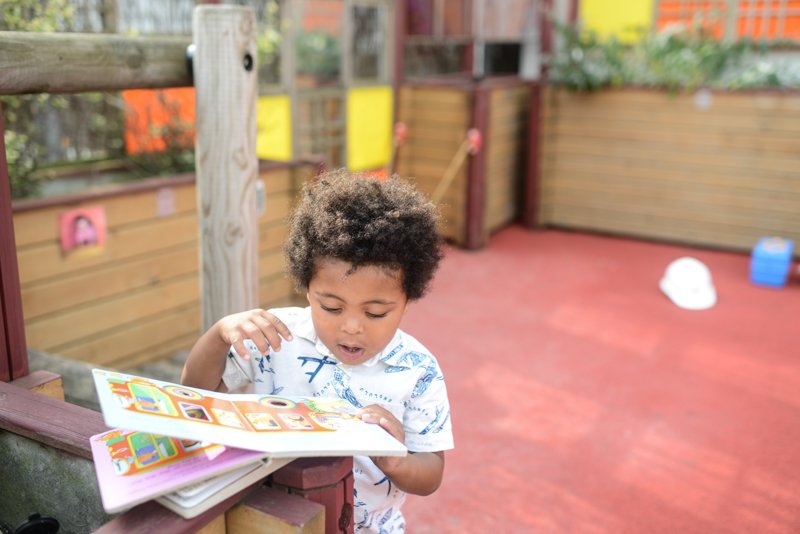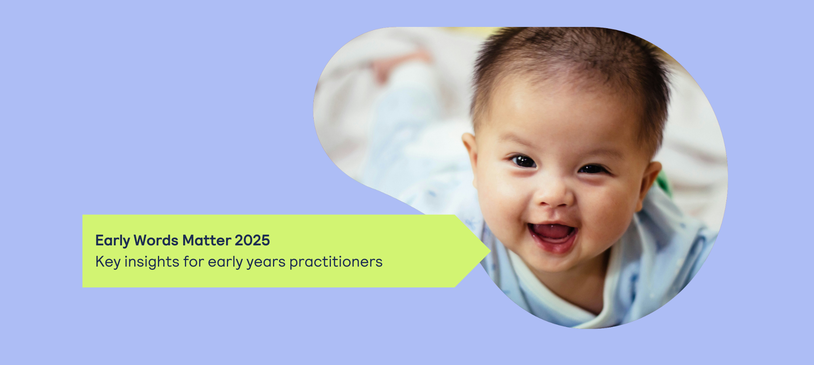In March, our very first Early Words Matter conference was held at KPMG, London. Around 150 early years practitioners joined us to explore how we can ensure children’s voices are central across provision, including in the home learning environment.
As our CEO Jonathan Douglas highlighted in his welcome address,
"The challenge is how to turn knowledge into action.”
Fortunately the knowledge shared by our stellar line-up of experts was practical as well as empowering.
So, here are some key insights from Early Words Matter 2025, which you can start applying to your early years practice today. At the end of the article, we’ll signpost you to resources to help implement some of these key learning points.
What were the key insights from the Early Words Matter Conference 2025?
Highlights from Dr Dan Wuori
Kicking off proceedings, US-based policy expert and author Dr Dan Wuori highlighted the importance of supporting literacy from the very start. Recent research shows that "At 24-26 weeks… we are plugged in as human beings.” Often, we expect children to be “ready to learn” when they start school. However, children will have started learning at around the third trimester – and so this is a vital time to nurture their communication skills – even while they’re still in the womb!
Practical takeaways:
- In your partnership working with parents and carers, let them know that it is never too early to chat, sing or read with their baby. Seemingly simple interactions, such as reading, singing, facial expressions and vocalisations, are helping to build children’s communication skills. The evidence of in utero learning is clear too – Dan treated us to a fascinating video of a baby instantly calming at the sound of a hip-hop song that their mother had played extensively while pregnant.
- Ensure in your everyday practice that you are providing many opportunities for engagement and interaction with the children in your care, and prioritise serve and return moments. Remember: you are effectively co-constructing children’s brains. Your role is important. As Dan concluded, “Optimal development is dependent on stable, nurturing relationships with highly engaged adults.”

Babies are always learning from you - serve and return interactions such as facial expressions and vocalisations go a long way to supporting their development.
Highlights from Greg Bottrill
Play expert and teacher Greg Bottrill was next with a lively discussion of how to employ an inner-child led pedagogy. Making use of what he describes as “play-full ness”, Greg described how tuning into our own inner-child can help practitioners to bring playfulness to activities and teaching, helping us to enable children to learn and dream.
Practical takeaways:
- Not all play needs to be nonsensical – but it helps! Greg encouraged framing the learning environment through the use of fun, creative language. In his own classroom, the maths corner has been named the Magic Corner, and is also home to a wizard.
- A sense of play can inform our approach to language in the classroom. Greg gave the example of reframing time – describing learning experiences and group work or one-to-one conversations as “adventures” or “time together”.
- This approach can also be applied to your work with parents and carers. For example, renaming parent-teacher meetings as “a conversation” can help to remove a sense of formality which may feel intimidating to some – in turn, potentially boosting the parent or carer’s engagement with partnership working.

Bringing a sense of play to your early years teaching can help enable children's learning.
Highlights from Jan Dubiel
Throughout the day, there was a strong focus on the value of early years practice. Pedagogy and policy expert Jan Dubiel explored this further by centring on the individual practitioner. Jan emphasised the importance of critical self-reflection, stating that we never ‘become’ early years educators - instead we are continually in the process of becoming one. The point of self-reflection, Jan outlined, is not to lose confidence in your practice, but instead to learn from your own experience, and hone your individual craft.
Practical takeaways:
- Jan gave some useful starting questions to encourage self-reflection:
- How is your practice informed?
- What influences you?
- What are your values?
- There is no one-size-fits-all approach to early years education. When looking at support needs, the question is not “What works?” but instead, “Under what conditions does this work?” This distinct approach is important particularly when it comes to inclusivity in practice.
- Make the time to engage with education research. Think critically about what you’re reading – does it reflect your own experiences and values?

Reflecting on our values as practitioners can help boost our abilities.
Highlights from Stella Louis
In her closing keynote, Froebelian expert Stella Louis underlined the significance of trusting children’s individual voices. Early years practice is often seen as preparation for the next stage of children’s lives – Stella warned us against this. As in fact, childhood is happening now, and children are learning now! “Children base their learning on first hand experiences,” Stella emphasised. “Yes, they learn from play - but overall they learn from experience.” This means that, whatever their age, a child’s need for interaction and learning is now - everything that the child engages with shapes their development.
Practical takeaways:
- To understand a child’s behaviour, start from a position of what they already know. By the time they reach the early years setting, children will have learnt so much from the world around them. Work from a position of developing their understanding – but also, develop your own understanding of them. As Stella stated, “Children all do something for a reason. Your job is to find out what that reason is.”
- If a child is struggling with something practical, such as removing a lid from a bottle, try standing back and allowing them to try to solve this themselves. Stella described this as a “good struggle”: an opportunity for the child to learn for themselves. If we jump in straight away to support, we could be taking away a part of their learning. If they solve the problem, allow them time to repeat the motion, practicing their newly acquired skill.
- Within their play and exploration, children often demonstrate repetition of certain behaviours. These repeated behaviours are what’s referred to as schemas, and are an important biological drive. Your early years setting can encourage schematic exploration by responding to the needs of children directly, enabling them to enact their own displayed schemas (with safety in mind). For example, if a child is repeatedly climbing things, ensure they have something to climb. If they are repeatedly spilling, give them something (and somewhere!) to spill.

Having the space to learn for themselves is a large part of children's development.
How can I embed this learning into my early years practice?
We hope you'll join us at next year's Early Words Matter - why not check out our upcoming CPD and conferences? We also hope that these practical takeaways will help boost early language and literacy provision in your early years setting, and support your own practice.
To help you embed some of these key learning points, take a look at the resources and research from our own offer below.
